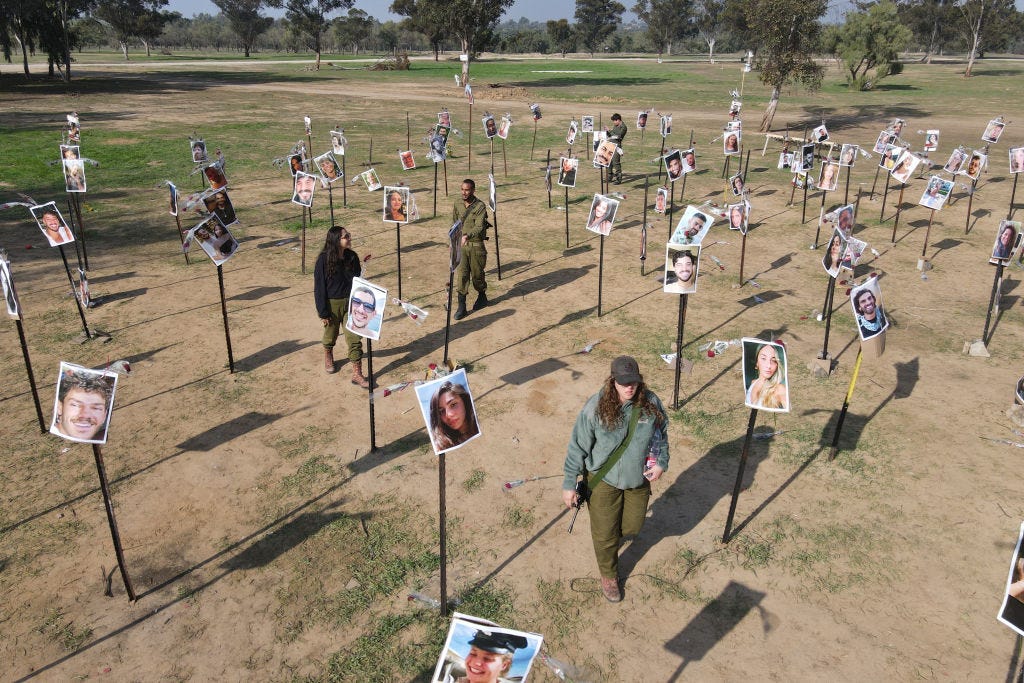Terrorism as Strategy
Israeli soliders at the site of the Supernova music festival walk between pictures of those killed or captured by Hamas on the 7th October
‘Exterminate, exterminate! That is the only way of progress.’
― The ‘Professor’ in Joseph Conrad, The Secret Agent
‘There is no terror in a bang, only in the anticipation of it.’
-Alfred Hitchcock
After Hamas attacked Israel on 7 October the BBC was condemned for refusing to label it a terrorist group. The BBC argued back that ‘terrorist’ was a pejorative and not a descriptive term and so loaded the debate. As John Simpson put it ‘Calling someone a terrorist means you’re taking sides and ceasing to treat the situation with due impartiality.’ To critics this meant avoiding the obvious feature of Hamas’s actions - a clear intent to terrorise Israeli civilians. Nor was this an isolated incident. Throughout its existence Hamas has consistently targeted civilians. For this reason the UK and US governments, and the EU, have designated it as a terrorist organisation. By refusing to acknowledge what to an observer seems a blatant design feature of Hamas and similar groups the risk is of appearing to make excuses for or even justify acts of unwarranted cruelty.
This issue is not new. After any act that combines a strong political cause with extreme violence, we will soon be reminded of the cliché that ‘one person’s terrorist is another’s freedom fighter’. The terms are not exclusive. One looks at motivation; the other at the act. Looking at one without the other risks distorting the picture: the violence might be explained or even justified by the cause but the cause can be compromised by the violence. Without any understanding of why people are driven to these acts there can be no consideration of root causes, including the impact of living under an oppressive state. Focusing only on terrorist acts risks neglecting the sources of a group’s strength and popular appeal. It also encourages the conclusion that such groups are so thoroughly evil that negotiation let alone reconciliation is impossible. In practice governments often insist that they will never talk to terrorists while quietly doing precisely that (as the UK government did with the IRA).
By itself the terrorist label does not take us very far. These groups have names and political programmes and if you want to understand them these need to be addressed. Hamas, for example, stands for Islamic Resistance Movement, and that already tells you quite a lot about how it views itself and what it is trying to achieve. Lumping together all groups that might be called terroristic misses their distinctive forms of leadership and the nature of their constituencies. It leads to such misconceived notions as President George W Bush’s ‘global war on terror’, which involved far too many potential targets and soon became incoherent, especially when it led to the invasion of Iraq.
The ‘terrorist’ label, which few embrace for themselves, has become a routine and often inappropriate means to denounce any opponent. Vladimir Putin regularly condemns his Ukrainian adversaries as terrorists though they are engaged in self-defence and it is Russia that targets civilian facilities. Groups such as the African National Congress during the days of apartheid South Africa used violence on occasion but not as their main form of pressure and often largely for sabotage. Yet they and their supporters, and many more innocuous groups, were covered by the 1967 Terrorism Act. Equally Israeli Prime Minister Benjamin Netanyahu, who defined himself politically from early on as a fighter against terrorism, and has written books on the topic, applies the term liberally, not only to groups who might deserve it, like Hamas, but also to Palestinian groups whose main business is human rights advocacy.
Keep reading with a 7-day free trial
Subscribe to Comment is Freed to keep reading this post and get 7 days of free access to the full post archives.


